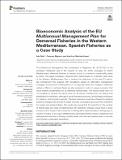Por favor, use este identificador para citar o enlazar a este item:
http://hdl.handle.net/10261/217033COMPARTIR / EXPORTAR:
 SHARE SHARE
 CORE
BASE CORE
BASE
|
|
| Visualizar otros formatos: MARC | Dublin Core | RDF | ORE | MODS | METS | DIDL | DATACITE | |

| Título: | Bioeconomic Analysis of the EU Multiannual Management Plan for Demersal Fisheries in the Western Mediterranean. Spanish Fisheries as a Case Study |
Autor: | Sola, Iván CSIC; Maynou, Francesc CSIC ORCID ; Sánchez Lizaso, José L. | Palabras clave: | Mediterranean fisheries Multiannual management plans Bioeconomic modeling Common fisheries policy Maximum sustainability levels |
Fecha de publicación: | jun-2020 | Editor: | Frontiers Media | Citación: | Frontiers in Marine Science 7: 459 (2020) | Resumen: | The Multiannual Management Plan embedded in Regulation EU 2019/1022 of the European Parliament and of the Council of June 20, 2019, envisages to reform Mediterranean demersal fisheries to restore stocks to maximum sustainability yields by 2025. This paper leverages a bioeconomic model based on a specific case study of the Western Mediterranean Sea to analyze the objectives of this new EU reform. We complement this analysis with simulations based on alternative management strategies: the reduction of fishing effort of 1–2 days-per-week and changes to selectivity patterns. Effects on artisanal fleets are also analyzed in order to assess scenarios that could achieve sustainability for all demersal fishing fleets. The results reveal that it is not possible to achieve the plan’s aims for all stocks. Furthermore, the fishing time established is insufficient, although it would increase economic, and biological indicators for medium- and long-term periods. The best scenarios would be achieved by applying selective changes that provide for faster recovery of biological and economic indicators for trawler and artisanal fleets. The results also reveal that the reduction in the number of fishing days per week complemented with selectivity changes would have a lower socioeconomic impact than a reduction in fishing effort based entirely on fishing days or number of boats. In any case, Mediterranean demersal fisheries require a significant and well-planned reduction in fishing mortality levels over the next several years to recover and maintain sustainable exploitation | Descripción: | 15 pages, 12 figures, 6 tables, supplementary material https://www.frontiersin.org/articles/10.3389/fmars.2020.00459/full#supplementary-material.-- All datasets generated for this study are included in the article/Supplementary Material | Versión del editor: | https://doi.org/10.3389/fmars.2020.00459 | URI: | http://hdl.handle.net/10261/217033 | DOI: | 10.3389/fmars.2020.00459 | E-ISSN: | 2296-7745 |
| Aparece en las colecciones: | (ICM) Artículos |
Ficheros en este ítem:
| Fichero | Descripción | Tamaño | Formato | |
|---|---|---|---|---|
| Sola_et_al_2020.pdf | 2,85 MB | Adobe PDF |  Visualizar/Abrir | |
| Sola_et_al_2020_Data.docx | 58,28 kB | Microsoft Word XML | Visualizar/Abrir |
CORE Recommender
SCOPUSTM
Citations
4
checked on 13-abr-2024
WEB OF SCIENCETM
Citations
4
checked on 27-feb-2024
Page view(s)
178
checked on 22-abr-2024
Download(s)
228
checked on 22-abr-2024
Google ScholarTM
Check
Altmetric
Altmetric
Este item está licenciado bajo una Licencia Creative Commons

